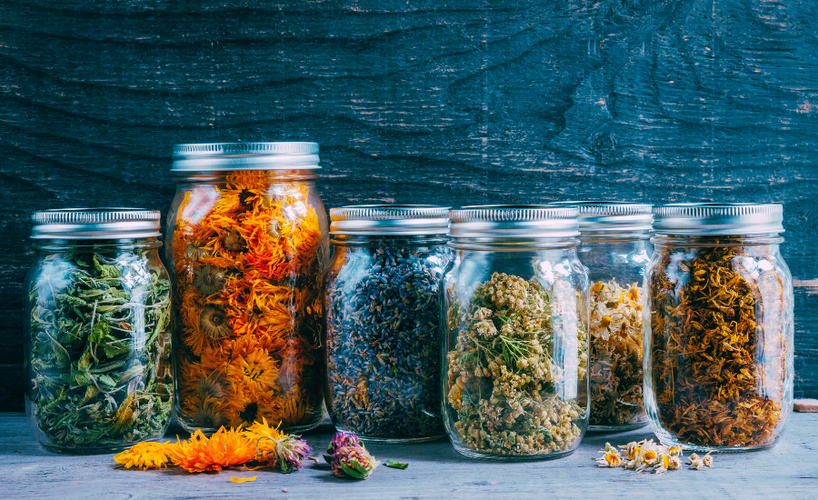STORING DRIED HERBS AND HERBAL PREPARATIONS FOR FRESHNESS AND LONGEVITY
Jul 9th 2024
STORING DRIED HERBS AND HERBAL PREPARATIONS FOR FRESHNESS AND LONGEVITY
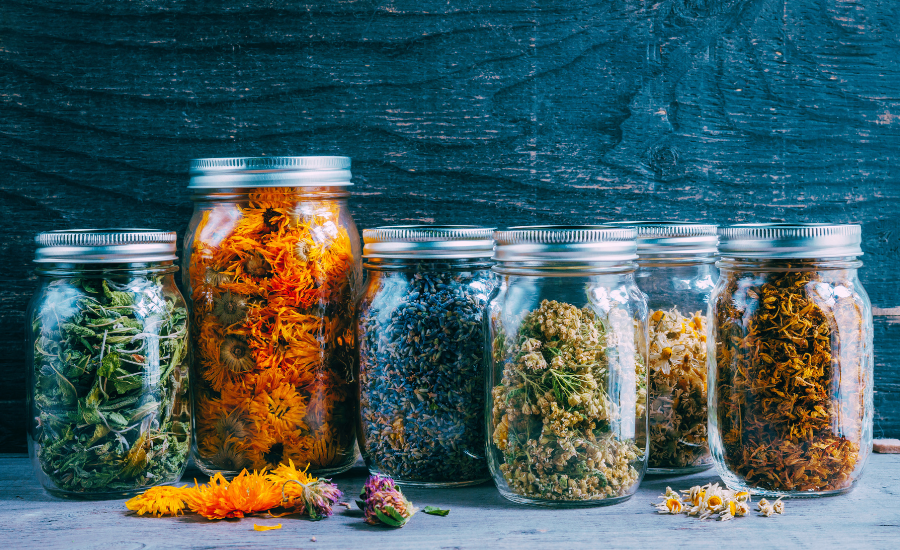
The What, When And How Of Storing Herbs
Proper storage for dried herbs and herbal preparations is crucial to maintaining their freshness and potency. When herbs are stored correctly, they retain their therapeutic properties and flavors, ensuring that you get the most out of your herbal remedies.
Benefits of storing herbs properly:
- Maintains Potency: Proper storage helps preserve the active compounds in herbs, ensuring their effectiveness.
- Enhances Flavor: Well-stored herbs retain their aromatic qualities, which is essential for both culinary and medicinal uses.
- Prevents Contamination: Proper containers and conditions prevent mold, pests, and other contaminants from spoiling your herbs.
This article will cover various aspects of storing dried herbs and herbal preparations to ensure longevity. You’ll learn about:
- The basics of storing dried herbs
- Best practices for storing tinctures and infused honeys
- Methods for preserving herbal oils and salves
- Strategies for maintaining the quality of powdered herbs
By implementing these storage techniques, you can extend the shelf life of your herbal collection, keeping it fresh and potent.
The Basics of Storing Dried Herbs
To keep your dried herbs potent and fresh, it's important to follow these basic rules for storage:
Selecting the Right Containers
Start by choosing the right containers for your dried herbs. Here are some options:
- Glass Jars: These are airtight and non-reactive, making them ideal for most dried herbs.
- Metal Tins: While useful for short-term storage, make sure they are lined to prevent any reactions.
- Vacuum-Sealed Bags: If you're looking for long-term storage, these bags are effective in preserving flavor and aroma.
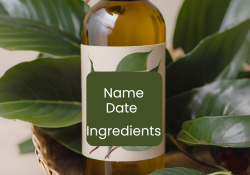
Labeling and Organization
Labeling Your Organic Herbal Apothecary Products
1. Compliance and Clarity:
- Product Name: Clearly state the name of the herbal product, such as "Organic Elderberry Syrup" or "Herbal Sleep Tincture."
- Organic Certification: If your herbs are certified organic, prominently display the organic certification logo or statement (e.g., "Certified Organic by [Certification Body]").
- Net Weight or Volume: Include the quantity of the product (e.g., 4 fl oz, 120 ml)
2. Ingredients List:
- List all ingredients in descending order of predominance by weight.
- Highlight organic ingredients if applicable.
- Avoid using trade names unless it's a common name for the ingredient (e.g., "Organic Chamomile Flowers" instead Botanical Name).
3. Directions for Use:
- Provide clear instructions on how to use the product, including dosage if applicable.
- Include any precautions or warnings, such as consulting a healthcare professional before use, if pregnant or nursing.
4. Additional Information:
- Herbal Properties: Optionally, describe the herbal properties or benefits of the product.
- Storage Instructions: Recommend how to store the product to maintain quality (e.g., "Store in a cool, dry place").
- Allergen Information: Declare any allergens present in the product (e.g., "Contains nuts").
This way, you can easily identify and use the oldest stock first, reducing waste and ensuring freshness.
Avoiding Light and Moisture
Exposure to light and moisture can have negative effects on your dried herbs. Here's what you can do to protect them:
- Light: Store your labeled jars in a dark cabinet or shelf to shield them from light, which can degrade herb quality.
- Moisture: Keep your herbs away from areas with high humidity and store them in a cool environment to prevent mold growth.
Additional Tips
Here are a few more tips to help you store your dried herbs effectively:
- Keep herbs in a consistent environment to maintain their quality.
- Avoid storing them near heat sources like stoves or in direct sunlight.
- Regularly check your stored herbs for any signs of deterioration such as discoloration or loss of aroma.
By following these basic rules, you can ensure that your dried herbs stay potent and fresh, ready to be used whenever you need them.
Storing Tinctures and Infused Honeys
Differences Between Tinctures and Infused Honeys
Tinctures are concentrated herbal extracts made by soaking herbs in alcohol or glycerin. They are potent and have a long shelf life. Infused honeys, on the other hand, involve steeping herbs directly in honey. This results in a sweet, herbal mixture that combines the properties of both the honey and the herbs.
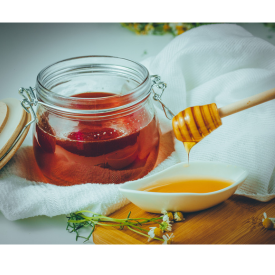
Best Containers for Storing Tinctures and Infused Honeys
Choosing the right containers is essential to maintain the quality of these preparations:
- Tinctures: Dark glass dropper bottles or amber jars are ideal. These containers shield the tincture from light, which can degrade its potency.
- Infused Honeys: Use airtight glass jars, preferably with a dark tint to protect against light exposure.
Proper Labeling and Dating
Labeling your herbal preparations accurately is critical:
- Include: The name of the herb(s), type of preparation (tincture or infused honey), date of creation, and any additional notes.
- Tools: Waterproof labels and markers ensure readability over time.
Tips for Maintaining Potency and Flavor
To keep your tinctures and infused honeys effective and flavorful:
- Storage: Store in a cool, dark place away from direct sunlight.
- Temperature: Maintain a stable temperature to avoid fluctuations that could affect quality.
- Seal: Ensure containers are tightly sealed to prevent air exposure, which can lead to oxidation.
Proper storage practices will help you enjoy the full benefits of your tinctures and infused honeys for an extended period.
Storing Herbal Oils and Salves
Proper storage of herbal oils and salves is crucial for maintaining their effectiveness and longevity. These preparations can degrade quickly if not stored correctly, leading to loss of potency and effectiveness.
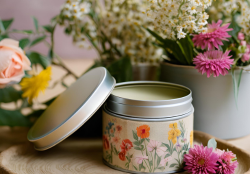
Suitable Containers for Preserving Quality
- Use dark glass bottles or jars to prevent light exposure.
- Ensure lids are airtight to avoid contamination and oxidation.
- If available add an oxygen absorber to the container.
Shielding from Light and Heat Exposure
Herbal oils and salves should be kept in a cool, dark place. Avoid storing them near heat sources like stoves or direct sunlight. Light and heat can cause these products to spoil faster by breaking down the delicate compounds within the herbs.
Tips for Prolonging Shelf Life
- For extended shelf life, consider refrigerating herbal oils.
- Transfer portions into smaller containers to minimize air exposure each time you use them.
- Always label with the date of preparation to keep track of freshness.
By following these storage recommendations, you ensure that your herbal oils and salves remain potent and effective for as long as possible.
Storing Powdered Herbs
Storing powdered herbs can be tricky because the fine particles are easily affected by moisture and air, which can make them less potent and fresh. Here are some tips on how to store powdered herbs properly:
Choosing the Right Containers
It's important to choose the right containers for your powdered herbs. Here's what you should look for:
- Airtight glass jars: These are the best option because they keep out air and other contaminants.
- Dark glass jars: If possible, choose jars that are made of dark glass. This provides extra protection against light, which can also degrade the quality of the herbs.
Protecting Against Moisture and Air Exposure
Moisture is one of the biggest threats to powdered herbs. To prevent it from ruining your herbs, follow these steps:
- Store in a cool, dry place: Find a spot in your kitchen or pantry that is away from any sources of heat or humidity.
- Do not store in the refrigerator. This may cause mold to develop in the jars.
- Use silica gel packets: Place these small packets inside your storage area to absorb any excess moisture.
- Secure lids tightly: After each use, make sure to close the lids of your jars tightly to keep out air and moisture.
Maintaining Potency
To ensure that your powdered herbs stay potent for as long as possible, here are some strategies you can use:
- Keep in small batches: Instead of storing all of your powdered herbs in one big jar, divide them into smaller containers. This way, you only expose a small amount to air and moisture each time you use it.
- Check for mold or degradation: Every now and then, take a look at your powdered herbs to see if there are any signs of mold or if they have started to lose their color or smell.
- Label with date of purchase: It's helpful to know how old your powdered herbs are, so make sure to label each container with the date you bought them or when you ground them.
By following these storage methods, you can ensure that your powdered herbs will stay effective and flavorful for a longer period of time.
Factors to Consider When Selecting Bulk Herbs
When choosing bulk herbs, think about these factors to ensure the best quality:
- Origin: Herbs grown in their native regions are often more potent.
- Harvesting Practices: Ethically wildcrafted or organically farmed herbs reduce exposure to pesticides and contaminants.
- Processing Methods: Minimal processing helps retain an herb's natural properties. Avoid suppliers who use excessive heat or chemicals.
Tips for Evaluating Herb Quality
Evaluating herb quality involves using your senses:
- Color: Freshly dried herbs should have vibrant colors. Faded hues can indicate age or poor storage.
- Aroma: High-quality herbs retain strong, characteristic scents. A lack of aroma may signal diminished potency.
- Texture: Herbs should feel crisp and dry to the touch without signs of moisture or mold.
Following these guidelines ensures that your herbal preparations are both effective and safe, laying a strong foundation for your home apothecary.
Conclusion
Proper storage is essential for preserving the freshness and potency of dried herbs and herbal preparations. Storing these items effectively ensures you get the most out of your herbal collection, maintaining their therapeutic benefits and flavor.
Applying the techniques shared in this article can significantly improve the quality of your stored herbs. Consider:
- Using airtight containers to prevent moisture and air exposure.
- Labeling and dating each preparation for easy identification and tracking.
- Avoiding light and heat exposure to maintain potency.
By following these practices, you can ensure your herbs remain effective and fresh for as long as possible.


